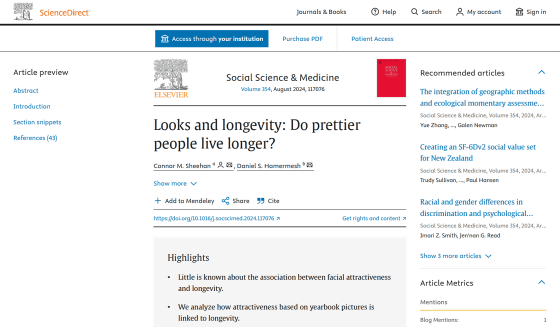Research reveals that high school graduation photos can predict whether a person is at high risk of death

If you have ever looked back at your high school yearbook for some reason, you may have thought, 'Maybe some of my classmates have already died.' A study of thousands of high school graduates in the late 1950s showed that 'high school graduation photos can predict to some extent who is at high risk of early death.'
Looks and longevity: Do prettier people live longer? - ScienceDirect

Your High School Yearbook Photo Could Predict How Long You'll Live : ScienceAlert
https://www.sciencealert.com/your-high-school-yearbook-photo-could-predict-how-long-youll-live
The theory that a person's appearance can predict their health has long been proposed, and past studies have shown that 'people with attractive faces have relatively strong immune functions.' However, there was little information available about whether physical attractiveness is related to longevity.
So Connor Sheehan , an associate professor of social science at Arizona State University, and Daniel Hamermesh, an economist at the University of Texas at Austin, decided to investigate whether physical attractiveness, as judged by photos in a high school yearbook, can help predict how long someone will live.
'Little is known about the association between facial attractiveness and longevity, but physical attractiveness may systematically structure important social stratification processes and inform underlying health outcomes,' the authors wrote in their paper.

For their study, the researchers used data from
The researchers then compared the data with mortality data collected by the US National Center for Health Statistics up to 2022 to analyze whether there was a relationship between physical attractiveness and risk of death. By 2022, the subjects were in their early 80s, and 43% of them had died.
The analysis showed that the one-sixth of people who were rated as the least attractive based on their graduation photos had a 16.8% higher mortality rate than the four middle groups. In other words, people who were less physically attractive in their graduation photos were more likely to die prematurely than those who were not. On the other hand, there was no significant difference in mortality rate between the four middle groups and the most attractive group.
Women in the 'least attractive' group had a life expectancy that was about two years shorter than the rest of the population at age 20, while men in the 'least attractive' group had a life expectancy that was about one year shorter than the rest of the population at age 20.
'Broadly speaking, we found that individuals who were rated as having the least attractive faces were at increased risk of mortality across their lifetime compared with individuals rated as average or highly attractive. Importantly, individuals who were rated as more attractive than average had little to no longevity advantage,' the researchers wrote in their paper.

The associations found in this study remained even after accounting for factors such as education level and income, but health status had the greatest effect on the associations, suggesting that poor health has a negative effect on physical attractiveness, which in turn creates a link between physical attractiveness and longevity.
'Social scientists should explore how physical attractiveness influences other processes that may contribute to the relationship with health and longevity,' the researchers said.
Related Posts:
in Science, , Posted by log1h_ik







